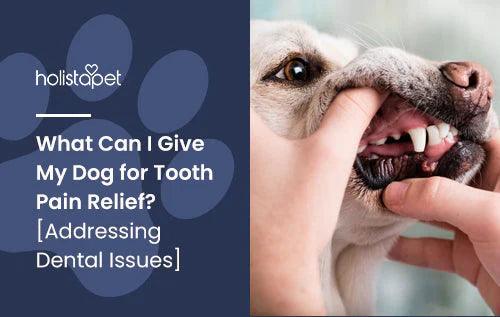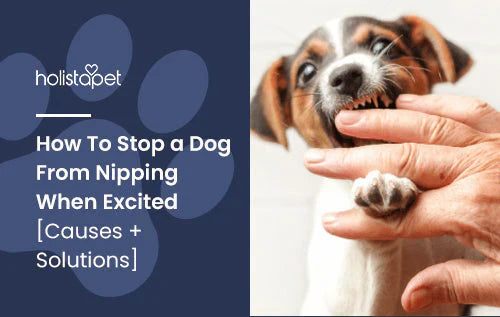If there's one thing that can keep us up at night, it's our dogs being in pain. After all, all they can do is stare up at us with their big 'ol eyes! When your dog shows signs of discomfort when eating and chewing, your first thought would be, "what can I give my dog for tooth pain relief?" After ruling everything else out, all signs may point to a toothache for your pup. There are a few reasons why your dog may be experiencing a toothache and a few things you can do to provide them with relief when experiencing dental pain. Keep reading to learn more!
Why Do Dogs Get Tooth Pain?
It helps to think of your dog's mouth and snout as the equivalent of their hands. After all, it's their main tool for exploring and understanding the world. Think about it; they pick everything up with their mouth! This is mostly because they don't have opposable thumbs, which is why they can't have jobs and can't pay rent. No, there isn't a dog behind this screen! We just said that they don't have opposable thumbs!
It's no surprise that dogs' teeth wear down more quickly than other parts of their body. When a dog's oral health is neglected, tooth pain begins. The most common reasons behind canine tooth decay are breakages, swollen gums, cavities, and tartar buildup.
If dental procedures have gone untreated, dogs may develop infections or other systemic problems. The only fully effective treatment to give your dog for tooth pain relief is addressing the problem. Pain medication only alleviates pain levels for a short time. If the issue is not addressed, the pain will continue to recur.
Common Behaviors of Dogs With Tooth Pain
Pet parents worry about their children. Yes, our children walk on all fours and greet us by licking our faces. We take it seriously when it comes to preventing tooth pain in our dogs. After all, they are part of the family. There are a few behaviors your dog may start to exhibit as signs of tooth pain. While pain meds can help relieve your dog's oral pain and discomfort momentarily, it is always best to seek the guidance of a veterinarian. Here are a few behaviors to look out for when your dog may be experiencing tooth pain:

Unusual Drooling
Dogs normally drool when they are playing with toys or chewing on treats. When they suffer from tooth pain, you may notice that they drool more than usual. The reason behind this is that the salivary glands work overtime when there's an injury or pain in the mouth. In some instances, blood may be visible in the saliva. If this is the case, we recommend taking your dog to the veterinarian to rule out any more severe health problems or problems.
Bad Breath
Dog owners usually dismiss bad breath as just “dog breath,” but there is usually a good reason behind the odor. It is a tell-tale sign that a dog may be suffering from periodontal disease or tooth decay. Either one of these can be causing severe pain and discomfort to your dog.
Related: Dog Bad Breath Home Remedies [The Guide to Fresh Breath]
Loss of Appetite
If any of you have had a toothache before, you know that it's painful to chew. So much so that you may not have much of an appetite. You may notice these same behaviors in your dog. They may start eating and then suddenly stop. Your dog may also whine or spit out its food mid-chew. A dog's health has to do with its entire body, just like ours! Lack of appetite may not only be a sign of tooth pain in dogs. Pet owners should seek the advice and guidance of their veterinarian.
How To Tell If A Dog Has Tooth Pain?
As mentioned above, a few signs can point towards your dog having tooth pain. While these behaviors are not entirely exclusive to tooth pain, there are also physical signs that you can see when your dog may be dealing with dental disease or discomfort. Upon realizing that your dog is in pain, your first thought is to reach into your medicine cabinet and grab your human medications!
Refrain from panicking and giving your dog your medication. Many medications formulated for humans contain ingredients that could be harmful to dogs. Here are a few things to look out for when assessing whether your dog could be suffering from dental pain:
- Suddenly not wanting to eat their favorite treats
- Chewing on one side of their mouth
- Slowed down eating
- Whining and pawing at their mouth
- Swollen, red gums
- Lesions on gums
- Crying while yawning
- Swatting at their face
- Discolored teeth
While some of the above could be signs of other issues, you need to take your dog to a veterinarian to rule out other potential severe health problems or issues. If it is related to dental trouble, your vet will advise you on how to possibly prevent tooth pain in the future.

Related: Home Remedies For Tooth Decay In Dogs [Actionable Tips]
Over the Counter Options for Dog Tooth Pain Relief
Looks like we're at that checkpoint again! As a general rule of thumb in veterinary medicine, it is not a good idea to administer human medication to your dog without the advice or guidance of a veterinarian. There are pain medications specially formulated for dogs with ingredients specific to their body's chemistry.
Non-steroidal Anti-Inflammatory Drugs (NSAIDs)
NSAIDs are a group of pain medications that include ibuprofen and aspirin. These drugs reduce inflammation and fever and can be specially designed for dogs. NSAIDs for dogs include Carprofen, Deracoxib, Firocoxib, and Meloxicam. While these pain relievers may temporarily relieve the pain associated with dental discomfort, they don't treat the issue.
It is also important to note that NSAIDs need to be prescribed by a veterinarian, so there is no chance that you can purchase these over the counter. This is listed here because most veterinarians won't prescribe something other than NSAIDs for dental pain relief. Like all medications, it is important to be aware of the possible side effects. You may want to monitor a few things when your dog takes NSAIDs:
- Extreme lack of appetite
- Skin redness
- Diarrhea
- Vomiting
- Tarry stool
- CBD
In the case of a toothache in your pet, some CBD dog treats or CBD oil would be the best form of administration here. CBD comes from the hemp plant and is one of over a hundred cannabinoids found in hemp. This compound is highly revered for its soothing properties in anyone with an endocannabinoid system! This includes your dog! All mammals have an ECS.

Now, you're probably wondering, "how can CBD help my dog when they're not feeling quite themselves?" Well, this is when their ECS comes into play. CBD supports the ECS by interacting with receptors found throughout the body. This interaction can help alleviate physical discomfort and comfort them throughout stressful situations.
What Is CBD?
Cannabidiol (CBD) is a non-intoxicating compound derived from the hemp plant. CBD is one of the many naturally occurring cannabinoids found in this magical plant. Did we mention magic? No need to panic; it's organic! Seriously. This compound is abundant in the hemp plant and is known for supporting the mind and body in many ways. The cannabis plant is very complex. Don't believe us? Well, the proof is in the pudding. CBD is worked by binding to ECS receptors all over the body to activate them and promote an overall balance (homeostasis).
Types Of CBD
As mentioned previously, CBD can come in the form of an oil and other edibles like soft chews and capsules. When trying to help your dog through a toothache, any of these options are viable. The goal here is to provide your dog with as much relief from dental cleaning as possible while refraining from making the process traumatic and stressful.
Soft Chews
CBD soft dog chews really are the perfect way to administer CBD to your dog, especially if they have trouble chewing. Our soft chews are enriched with all-natural ingredients that work together to relax your dog and help regulate their mood. Besides all these added benefits, CBD can help temporarily relieve discomfort caused by inflamed gums or dental issues.
CBD Oils
CBD oil for pets can be the easiest way to give CBD to your dog for tooth pain relief. This requires no chewing on their part, and if you're able to drop the oil directly into their mouth, that's great! If not, you can always try mixing it into their food or even putting it in their water. Keep in mind that if the oil is mixed into their food or water, it must go through the metabolization process. This means that your pup may not be receiving the amount of CBD you think they are. Once all the enzymes break down the oil in the gut, their body will utilize the remainder.
CBD Capsules
While we swallow capsules with water, there's no way you're going to keep your dog from chewing! Even if it does hurt. Chewing these capsules alone will probably be enough for them to never want to ingest one of these pills ever again because there's no way it has a very enticing taste. You can use pill pockets to disguise the capsule, or you can break it apart and put the powder in their food or water.
How Much CBD Should I Give My Dog?
We've gotten to the frequently asked questions portion! Some questions are personal, so please refrain from asking. We could tell you how much CBD to give your dog, though! Like most medications and supplements, it depends on your dog's weight! A few other things can be considered, such as your dog's medical history and other medications they may be taking.
A good rule of thumb is to start with 1-2 mg per every 10 pounds of body weight. For example, if your dog weighs 20 pounds, an ideal amount of CBD would be around 40 mg (20 x 2). You can always seek the guidance of your veterinarian in regards to dosing. It is also recommended that you take your dog to the vet to get a check-up at some point!
Final Thoughts - What Can I Give My Dog for Tooth Pain Relief?
No one likes going to the dentist. Those that do may have a problem. Kidding! Seeing our dogs in pain and discomfort is enough to make us desperately ask "what can I give my dog for tooth pain relief?" There's no need to panic! Fortunately, a few things are available to help manage their discomfort while you schedule a visit with their vet. It is always best to establish a full dental care plan and care for your dog's teeth!







![Probiotics For Dogs [Soft Chews] - HolistaPet](http://www.holistapet.com/cdn/shop/files/Probiotic-Infographic-1_472d7a29-e30c-435a-9638-1365d8c3a9f9.jpg?v=1725384841&width=104)



























Leave a comment
All comments are moderated before being published.
This site is protected by hCaptcha and the hCaptcha Privacy Policy and Terms of Service apply.